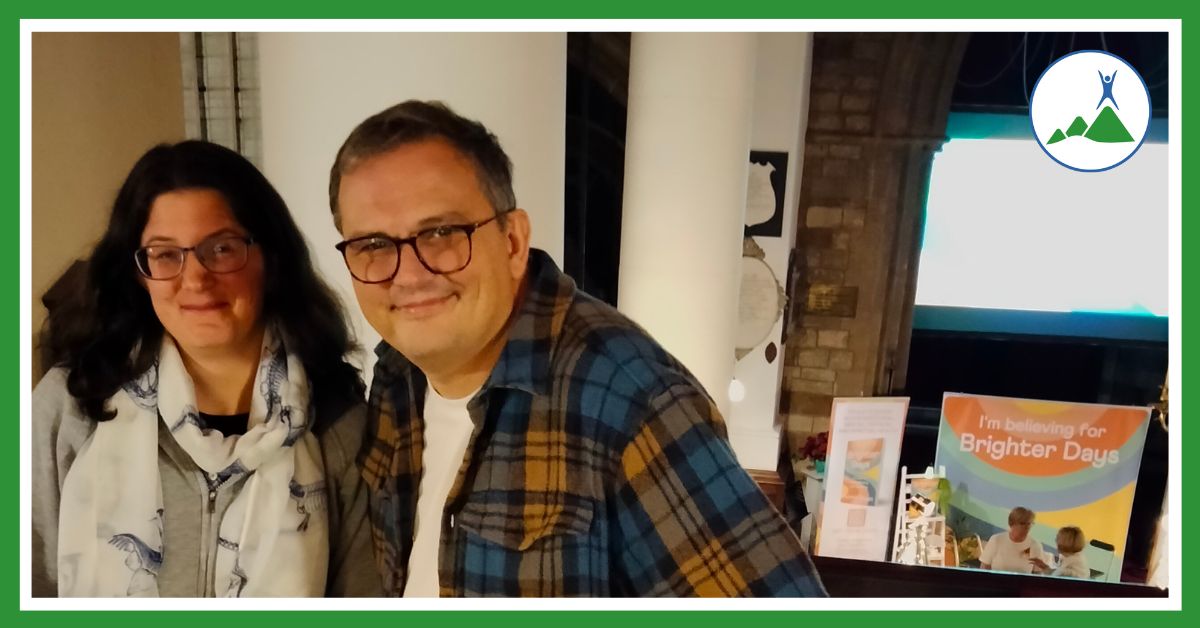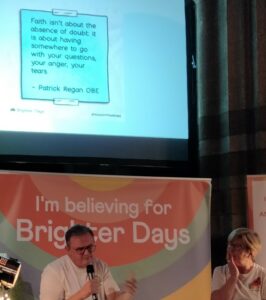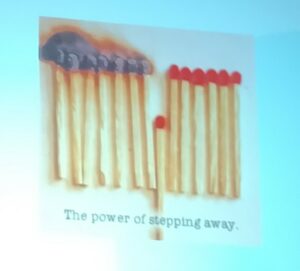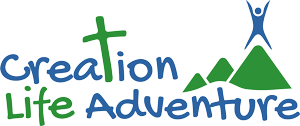 Last autumn, I went to an event at Wollaston and met Patrick Regan, founder of the mental health charity, Kintsugi Hope (among others). He kindly took time from his busy schedule to talk to me and we chatted about his own mental health journey and latest projet, Brighter Days. Read on for more…
Last autumn, I went to an event at Wollaston and met Patrick Regan, founder of the mental health charity, Kintsugi Hope (among others). He kindly took time from his busy schedule to talk to me and we chatted about his own mental health journey and latest projet, Brighter Days. Read on for more…
Or listen here:
So why are we here Patrick?
Brighter Days is my seventh book. We really wanted to create an event [alongside the book] where, whether you have faith or no faith, you could come and have a really good night. [Where you] learn things that could help you in your wellbeing, learn some tools and techniques, listen to some incredible music with a bit of a message as well. So far so good. We’re meeting the most incredible people with incredible stories.
That’s really interesting. Everybody has a story to tell whether they know it or not…
It is. And it’s about creating safe spaces where people feel they can tell you their story. I think what we often do with stories [is] only show the highlights reel. We often do it on social media don’t we? But I think when you’re honest, that creates an opportunity for someone else to be honest. And then you start to connect at a different level. You start sharing.
It’s been amazing meeting some incredible people. Some people [have] come up to me and said [they’ve had] family, a relative, that died by suicide recently, and they’ve just been trying to walk through that. Another person – they lost their husband recently from illness. It’s been a privilege to provide the space for people.
And it’s great that you do. I wonder if you could share a bit more about, what Brighter Days is. I know you’ve got a book and a website too. It’s something new that you’re starting…
Brighter Days was originally inspired by an Emeli Sandé song, which she wrote during the pandemic where the whole lyrics were about [how] the stuff we go through is really hard but isn’t wasted. And sometimes it could be the tool for someone else’s journey. What we wanted to do was to give people tools for them to use to improve their mental health. The whole vision was for people to say loud and clearly that poor mental health doesn’t have to be a life sentence. There is hope. So we’ve written the book, we’ve done the tour, we’re even starting a business to take the message of Brighter Days into the workplace. Poor mental health is the biggest cause of staff absences in this country. It costs the economy, I think, £119 billion a year, and we know that 45.8 million adults are struggling.
Wow!
60% of those people who are struggling say that they never access treatment. And the staggering statistic is nine out of ten people who struggle still think there’s so much discrimination and stigma when it comes to mental health. So we’re trying to go into businesses, into educational settings, into the hospitality industry and all sorts of different sectors really, to try and give people the tools to cope with what life chucks at them.
It sounds like it’s very needed. I’ve had some mental health issues myself and it’s hard. Even when you know there’s supposedly not so much stigma around, there is.

I think you’re right. We’re very comfortable thinking and talking about physical health. But with mental health there’s still that sense of, “How will people react? Will they treat me differently?” And you can be struggling with your mental health and still be very high functioning. I think that’s the other misconception people have…
And of course we all have mental health in the same way as we have physical health […] So Brighter Days is saying be really intentional about your mental and emotional health. Just as you may watch what you eat for your physical health or you may exercise, you may go to the gym, you know the things you need to do [for your mental health]. If we can get into a culture where people know the things to do to care for their mental health, we can solve a lot of people’s pain.
And if people know about it and it’s acceptable to do it that’d be great.
There are little tools we can learn as well. There’s one thing I learned (it’s in the book) about anxiety, where I talk about negative thoughts – the fact that everyone has negative thoughts and you can’t stop them coming. They’re like trains that appear every couple of minutes. And sometimes the harder you try not to think about something the more you do think about it. So in the book I [explain] this little tool called “Take the thought to court.” The idea is you put the thought in a courtroom and go, “Is there enough evidence to suggest that this is true?” And nine times out of ten there isn’t – you’re just in that negative moment. So you can go, “No, my thoughts are not me. They’re part of me but they’re not me.” That little tip. It can help.
I like that, it sounds a bit like when I did some CBT (cognitive behavioural therapy) to help myself. I did the same kind of thing but saying “Take the thought to court” makes it more fun!
Accessible
If you’re struggling, sometimes it’s hard to do anything positive so little things like that are helpful. That’s what I think is good about your book, Brighter Days. You’ve got lots of little things you can dip in and out of when you can’t deal with reams of information…
It’s true. When I had a mental breakdown […] and everyone was recommending books, really thick books, medical books, I was thinking to myself, “I can’t read anything!” My head was all over the place. And it didn’t feel accessible. I just needed something that was stripped back so I could go, “I know how to apply that to my life.”
That’s what we tried to do with this book particularly. The other thing we did, as well as the normal research, we also asked loads of questions on social media like, “What does anxiety feel like?” Within an hour I had hundreds of answers, and they were fascinating. I remember asking, “What is resilience not?” Or “What is forgiveness not?” Or “What are the symptoms of depression that no one talks about?” It felt like this made the book authentic. And it wasn’t just my voice, it was loads of people joining in saying this is what it’s like.
So you’ve done the research, you’ve asked real people, you’ve pulled it all together and made it simple. That’s much better than one person’s voice because even if you have, say anxiety or depression, no two experiences are the same, are they? So you think you know everything but…
You’re so right because one size never fits all. That’s the key. We use something in the book from Professor Patrick Pietroni and he talks about the resilience river. He says that every river has some rocks on the bottom, and the idea is if you’re rowing a boat and your resilience river is running low, you’re more likely to crash on those rocks. But those rocks may be very different for you than they are for me. [And you can’t remove the rocks, just deal with them how it’s best for you]. I lost my uncle about a year ago and a lot of self-help books would be, “Let’s get the rocks out of the river, let’s get them out of your life.” But actually, it’s not possible, my uncle’s not coming back.
 Something like anxiety is interesting for me (I still struggle with anxiety) but what I’ve learned is if my resilience river’s running low I’m going to crash, and it’ll take me out for a couple of weeks. So what I have to work on is what things in my life drain my resilience river and what are the things that lift it up. What are the practical things I can do every day that means I’m gonna be able to float across the anxiety? I remember [mentioning] that at some event and a lovely lady came up to me who’d been on a cancer journey and she [said she] put her resilience river on her fridge and made sure there were enough arrows going up in her day to make sure she didn’t crash. That’s huge, amazing.
Something like anxiety is interesting for me (I still struggle with anxiety) but what I’ve learned is if my resilience river’s running low I’m going to crash, and it’ll take me out for a couple of weeks. So what I have to work on is what things in my life drain my resilience river and what are the things that lift it up. What are the practical things I can do every day that means I’m gonna be able to float across the anxiety? I remember [mentioning] that at some event and a lovely lady came up to me who’d been on a cancer journey and she [said she] put her resilience river on her fridge and made sure there were enough arrows going up in her day to make sure she didn’t crash. That’s huge, amazing.
That’s a really good analogy. While you’re talking about anxiety and resilience could you share how you manage to do the amazing things you do like public speaking? It could appear like you’re alright and don’t really know about this topic. Which of course isn’t true, and we know that because of the things you’ve written and shared. So what kind of things practically do you do to help yourself manage, stay resilient and look after yourself?
I’ve learned over the years (and I’m not an expert and I need to remind myself all the time) that inner dialogue is huge. We are our own biggest critics. I’ll do a talk tonight and the first thing I’ll do after is go, “Ah, I didn’t do that very well.” That’ll be the negative thought. My inner critic will start getting very agitated. I think it’s learning how to cope with that and what are the things that can produce happiness in our lives.
I remember hearing another researcher saying find three things a day that you’re grateful for and write them down. In the book I talk about gratitude being to hunt the good stuff. It doesn’t mean the bad stuff’s not there but if you can write down just once a day, three things that you’re grateful for…
The second thing he said – if you can write one email that’s just kind. In just two minutes a day how your relationships will then change will be amazing.
Thirdly he said take three or four minutes, don’t look at your phone and watch your breathing. Relax and breathe in for seven and out for seven, whatever it may be. It changes things.
It’s statistically proven if we build these things into our lives, it does help our wellbeing.
You’re a Christian aren’t you? I was just wondering how this helped (or even hindered) how you are with your mental health?
I think spirituality is a massive part of wellbeing but is often left out of books because it’s misunderstood, or people have had a really bad experience. I 100% understand that – my experiences haven’t always been positive. What spirituality does is it creates that sense of being connected to a bigger purpose. I think prayer and meditation are incredible ways of dealing with anxiety and things like that. So faith definitely has a massive role to play in wellbeing.
For me […] I wish He [God] would come and take away my anxiety. And I wish all the people I love didn’t get cancer and do well instead. But they don’t and I have lots of questions. I read the Psalms and 40% of the Psalms of David ask questions saying, “I don’t get it, don’t understand, but I trust you anyway.” And I feel I’m in that place where I go, “It’s confusing for me sometimes, but I trust you anyway.” And I think that’s what faith has been for me – trusting when it doesn’t feel like I can begin to trust.
“That’s what faith has been for me – trusting when it doesn’t feel like I can begin to trust.”
Just before we wrap up, one more question. If there was one piece of advice you’d give someone who’s struggling with their mental health, what would that be?
That’s easy! My friend and I, he’s one of my best friends, we sign off every text with each other as, “Go gently.” So, go gently. Just take a day at a time. An hour at a time if you have to. Don’t make yourself feel guilty because you’re struggling. […] I think gentleness is a strength. Not a weakness.
Thank you very much Patrick. It’s been lovely to talk with you and I wish you well for tonight’s show.
And the show was great. Patrick connects so authentically with people and it was a privilege to chat with him.
To find out more about Brighter Days including how you can get a copy of his book: https://www.brighterdays.life/
And here’s another of his charities, Kintsugi Hope, which I think is fantastic too: https://kintsugihope.com/
